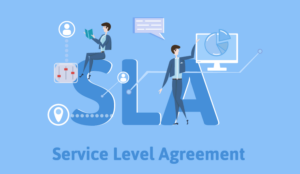Customer service is not as simple as it used to be. Your customer service objectives need to achieve more than the basics.
Brands can’t simply rely on a reactive approach because customers today expect so much more.
They observe, believe and respond positively to brands whose service is efficient and proactive.
How do you know your team exceeds customer expectations? How can you measure that objectively?
By setting and achieving the right customer service objectives.
Because the truth is, your service experiences ARE the stories your brand tells the world.
And your customers will only rave about your brand when you hit your service targets consistently. Aksheeta Tyagi at Sprinklr explains which client service objectives you must set — and practical ways to crush them.
What Is the Primary Objective of Customer Service?
The primary objective of customer service is to make customers happy so you can retain more of them.
Happy customers not only result in higher retention but also help you spread the positive word more organically.
Good things get spoken about. So, keeping your customers at the core during every interaction is a sure-shot way to attract new prospects. Customers have different needs during different stages of their customer journey. So, your customer service objectives should cater to each, too.
- Awareness: At this point, customers don’t have strong purchasing intent. Your customer service must focus on targeted marketing and strengthening initial perceptions.
- Consideration: Since customers are now evaluating their options to choose the best, your team should answer all common pre-purchase questions.
- Purchase: Help your customers smoothly complete purchases and assist them with all order-related queries like billing, shipping and status updates.
- Retention: You must stay just as vigilant with your after-sales service. Ask for feedback and offer product support, warranty services and loyalty rewards.
- Advocacy: Continue engagement with regular check-ins and services like referral bonuses, free technical assistance and personalized discounts.
Your idea of achieving the primary objective should lie in compassion. Your customers want to be heard, felt and seen. Look at things the way you’d have wanted if you were in their place. Doing so can help you match expectations with solutions that precisely crack their problem.
It goes without saying that a calm, collected demeanor is essential, even during the toughest of conversations. Owning up to mishaps and quickly resolving conflict is the true mark of high-quality, efficient customer service.
Benefits of Client Service Objectives
Here are some benefits of customer care objectives that help you define the roadmap of your customer service initiatives.
Harmony and Collaboration:
Setting clear customer service goals ensures everyone is aligned and moving towards the overarching ambitions of your business.
Think of it as the antidote to the chaos of mismatched priorities and the silo mentality that can plague even the best of teams. They cut through the noise, erase the lines between “my work” and “our goal”, and pave the way for seamless cooperation.
Few Operational Issues:
Setting precise objectives can help you combat hiccups head-on. It enables you to prevent lags, delays and miscommunication, directing efforts toward shared goals. For example, generative AI in customer service can highlight specific issues to troubleshoot, along with remedial actions on the go.
Realistic Goal Setting:
Clear objectives help you acknowledge your starting point with brutal honesty — spotting the gaps as clearly as the strengths. It’s about choosing to focus on sharpening your response times this quarter and improving your resolution rate next. They help you let go of lofty aspirations and pick up battles you can win, one step at a time.
Higher Satisfaction and Loyalty:
The true north of your efforts? It’s the customer satisfaction and loyalty of those you serve. Every objective met is a promise kept, a trust deepened. Achieving your client service objectives helps you create a sense of belonging so profound that leaving never crosses their minds.
11 Customer Service Objectives for Businesses
Did you know that almost nine in 10 Americans use customer service to decide whether to buy from a business or not?
Makes you wonder if you’re nailing your customer service strategy, right? These customer service objectives will help you wow your people every time.
1. Don’t Lag, Resolve Issues Quickly
Your customers simply want you to solve their problems faster.
They feel unimportant when there’s a delay in customer service. So, here are a few points to keep in mind.
- Ensure your customer response times are as low as possible
- Build a knowledge base to help your customers resolve queries themselves
- Empower your agents with tools that accelerate real-time resolutions
Imagine you go to a restaurant that messes up your order.
If the staff quickly acknowledges the error, apologizes and offers a solution like a free dessert or a discount on the next visit, wouldn’t you think about visiting again? Voila!
2. Shrink Your Costs and Boost ROI
You might end up spending more to compensate for the damage caused by poor customer service.
Improper workforce management or ineffective resolutions can cost you new as well as old customers. A key goal for customer service should be to reduce your costs and boost revenue.
- Deploy Automation: Use chatbots powered by AI to tackle a majority of issues and minimize agent dependency.
- Distribute Workforce Wisely: Calculate capacity and manage your workforce based on case volumes, SLAs and handling times.
- Standardize Customer Service: Define processes to avoid last-minute chaos or confusion during live interactions.
- Let the Community Work for You: Reduce your ticket loads by empowering users to help each other by building a customer community.
- Fuel Your Marketing Initiatives: Customer service data is a treasure trove of hidden insights for your marketing team to personalize campaigns and boost conversions.
You need to go beyond the short-sighted approach of just helping out when necessary. It’s a crucial customer service objective to make life easier for marketing, sales and products.
Pro-tip: You can use generative AI to improve customer experiences. Use it to study the fluid perceptions prevalent in the market and leverage the insight to ideate marketing campaigns and even build sound strategies in the long run.
3. Turn Your Team Into the Finest Advocates of Your Brand
Preaching is only authentic if you practice it, too. When your own people believe in what you do, they’ll be able to offer help that makes customers more loyal to you.
After all, your agents are the soldiers at the frontline, which means they always have the power to influence customer interactions — for better (and for worse).
To get started with employee advocacy:
- Encourage product usage so your employees know the value of it
- Leverage their social networks to share positive brand content
- Allow agents to share their personal anecdotes to humanize customer interactions
For example, let’s say you have an Edtech company. When a customer reaches out asking about the best learning courses for sixth graders, your agent can recommend courses their middle schooler is learning from.
Customers love candor even more when it’s coming from one parent to another.
Need Inspiration? Take a Cue From Cisco.
The tech giant recently accelerated employee advocacy by empowering 70K employees to leverage their social media networks to amplify the company’s messaging. News, campaigns and BTS content.
To make advocacy simple, they used Sprinklr’s Advocacy solution that offered brand-approved media assets – optimized for mobile and desktop – for Cisco folks to share on the go.
With strong approval workflows and governance, we ensured all messages were on-brand and compliant with the host platform’s guidelines, ensuring Cisco was portrayed in the right light every time, everywhere.
The result?
- 48% of employees shared, on average 10 posts/month
- Employee advocacy created an estimated market value of $200K
That’s some serious customer service goals!
4. Repair Broken Relationships and Your P&L
If your product is great but your customer service is not, your customers will still leave.
In fact, a service-based issue makes a customer four times more likely to switch to a competitor. And while happy customers become your brand evangelists, unhappy ones tend to become vocal critics. Look into the root cause of customer dissatisfaction and deploy one or more of these ways to mend broken relationships:
- Long Wait Times: Deploy AI chatbots trained to resolve your most frequent use cases.
- Poor Customer Experience: Listen, empathize, apologize and give a justified resolution.
- Multiple Call Transfers: Defuse tense situations with straightforward escalation routes.
- Product Quality Issues: Fix underlying issues, update them on improvements and incentivize a repeat purchase.
5. Improve Customer Retention and Lifetime Value
You are likely to keep more customers if they are satisfied with your customer service. Over time, multiple happy service experiences turn retention into loyalty.
Your customers are now not only thinking about just buying again but also choosing you every time they need what you sell. Let’s take notes to know how.
- Quick but poor resolutions are damaging, so effectiveness is the key
- Omnichannel customer service gives users flexibility and boosts customer satisfaction
- Consistent experiences across every touchpoint build long-term loyalty
Loyal customers with nothing bad to say about you will also eventually end up spending more on your business.
And when this revenue is calculated over a period of time, we call it customer lifetime value. The higher it is, the better.
6. Make Your Ratings and Reviews Shine Brighter
Yes, it’s true — 98% of customers read online reviews to find information before they shop.
And they trust user-generated ratings and reviews since they come from customers like themselves, not brands.
Being authentic, they set your brand way ahead of competitors using paid advertisements, celebrities and influencers to earn goodwill. So, here are a few ways you can achieve this customer service objective.
- Respond to every feedback, good or bad. It shows integrity and willingness to improve
- Use reviews to detect process or product flaws and build to rectify them
- Build your brand community and host events to boost engagement
- Create video testimonials to show happy customer stories to build credibility
- Launch a loyalty program to reward customers who consistently buy from you
7. Track KPIs That Matter
Tracking metrics is an example of a customer service objective that quantifies your effort against the output. Your north-star metrics will paint you a complete picture of your team’s performance.
- Customer Satisfaction: the percentage of satisfied customers — often measured with customer ratings on a scale of five.
- First Response Time (FRT): the time it takes to respond to a customer after they first reach out
- Average Handle Time: as the name suggests, it’s the average time taken to handle a ticket
- Net Promoter Score (NPS): a loyalty metric based on a customer’s likelihood to recommend a company — measured on a scale of one to 10. Those who rate nine or 10 are Promoters, seven or eight are Passives, and those who rate from zero to six are called Detractors.
8. Collect Feedback to Perfect Your Product
The best way to improve your product is simply just to listen to the problems your customers report. They’ve been using it for some time, they know what works and what it lacks.
- Analyze your recorded calls and chats to uncover prevailing complaints, expectations and suggestions.
- Encourage your customers to share their thoughts through customer surveys after ticket closures and conversions
A core objective for customer service is to find out how to upgrade your product. An improved product will always delight users — whether you’re introducing features to solve a highly reported problem or debugging glitches that hinder product usage. Instead of assuming what might work, use direct public opinion to mold your offering.
9. Arm Your Army With All the Skills They Need
Customer experiences highly depend on who’s delivering them. And, well, experts know how to make them memorable. As a manager, coaching agents is a customer service goal you should seek proactively. You can hold group sessions or isolate training to target agents’ individual shortcomings.
- Drill down on soft skills like emotional maturity and social aptitude
- Ensure everyone on the team has holistic product knowledge
- Don’t sideline skills like problem-solving, negotiation and critical thinking
Training your agents helps each team member learn, grow and perform their best at every customer interaction.
10. Boost Agent Morale for a Positive Domino Effect
Revitalize the workplace by merging gamification with stress-relief practices, aiming to boost agent morale, engagement and health. Infuse your workspace with a blend of fun challenges and soothing wellness practices.
You need to uplift your team’s spirits, making every day not just about getting through the tickets but also about cherishing wins and taking care of them. Your team needs to overcome call centre burnout and have a sense of achievement and well-being in its daily grind.
- Celebrate wins. Every ticket is resolved, every customer compliments — it all adds up. Introduce a rewards system that recognizes these moments, turning them into points, badges, or even wellness perks.
- Set up wellness quests. Give points for mindfulness breaks, hydration challenges, or a daily walk. Encourage them to pause, even if just for a moment, to breathe and stretch.
- Enable tracking with a dashboard. Give them a space to see their progress, both work-related and wellness goals. It’s their personal nudge to balance hard work with health.
11. Give Your Customers a Stage
They have a lot to share, and capturing the voice of the customer is an important step towards user-centricity. There’s much power in the say of the ones served — that’s also exactly why one of your customer service objectives should be to give your audience the much-deserved spotlight.
Encourage more and more user-generated content and ask them to weigh in on the quality and experiences they’ve had with you. Maybe offer them incentives for speaking up and use their voice to establish credibility for your claims.
3 Things Businesses Need to Attain Customer Service Objectives
Whatever objectives you decide upon, the idea rests on exceptional service, regardless of who needs it, what they need, when they need it and how.
To ensure you implement your customer service objectives effectively, keep in mind these three absolute elements of customer service.
1. An Omnichannel Presence
Customers who need help are usually impatient. They want to connect with you quickly and get resolutions within minutes.
Now, it becomes your responsibility to answer them on their channels of choice.
While a multichannel contact centre does operate on many channels, it fails to unify any of them. And so, you must empower customers to switch between channels seamlessly — without having to repeat any information.
Omnichannel customer service connects conversations from all channels, so every agent has the complete context of any situation, regardless of the channel used.
2. Catalyzed Improvement From Poor Feedback
Brands that firmly stay vigilant to rectify bad feedback always stay ahead in the market.
Unhappy customers are inevitable in any business. But how fast you turn that frown upside down shows how much your customer service team values their customers.
Moreover, you can use data from these unhappy customer interactions to train your agents to perform better.
Your customers are also unlikely to switch to a competitor when you quickly remedy poor feedback. And you avoid minor complaints from escalating into serious grievances.
3. Tailor-Made Resolutions for Customers
Almost eight in 10 customers are more likely to spend on businesses that deliver personalized CX. You can personalize your service experience when you can predict what your customers want. And that’s only possible when you have a holistic understanding of the customer via their:
- Demographic customer data
- Past purchase behavior
- Service conversations pulled from all channels
- Social media footprint
Service teams need to access a system that unifies such customer data. They need a singular space that tracks their digital behavior and uses intuitive AI to find the best time and way to provide support.
The only way to ensure assuredly relevant and connected experiences is to have a Unified Customer Experience Management (Unified-CXM) platform.
Because a Unified CXM helps you approach support with a certain synergy between you and your user.
Your customer service acts as one unit, no matter how complicated or branched a case may be. This capability ensures your customers always receive hyper-personalized customer service that is true to their needs.
Final Thoughts
Good customer service is no longer just about fixing problems.
Your customer service objectives should always aim at compassionate, helpful interactions. The ones that retain buyers, turn employees into brand advocates and revive customer relationships.
Frequently Asked Questions
How Can Customer Service Objectives Be Measured?
Customer service objectives can be measured using customer experience metrics like customer satisfaction (CSAT), net promoter score (NPS), average handle time (AHT), etc. You can use a reporting and analytics solution to automate and visualize your performance.
What Steps Can Businesses Take to Make Frontline Employees Meet Customer Service Objectives?
Businesses can take these steps to make frontline employees meet customer service objectives:
- Solid Training: Shift from lecture mode to interactive workshops. Make learning engaging, practical, and fun.
- Tech Tools: Equip your team with tech that simplifies, not complicates, their tasks. Think user-friendly and efficient.
- Open Feedback: Keep communication channels wide open. Feedback is gold; use it to grow and improve.
- Celebrate Wins: Recognize both the big achievements and the small victories. Morale soars when the effort is acknowledged.
What Are the Common Pitfalls to Avoid When Setting Customer Service Objectives?
Some of the common pitfalls to avoid when setting customer service objectives are:
- Setting targets that are too ambitious or vague leads to team frustration and lack of focus.
- Failing to align objectives with the broader business mission and values causes misdirection.
- Neglecting to revise objectives based on frontline feedback and performance data, resulting in stagnation.
Author: Guest Author
Published On: 4th Apr 2024 - Last modified: 6th Dec 2024
Read more about - Guest Blogs, Aksheeta Tyagi, Sprinklr



































